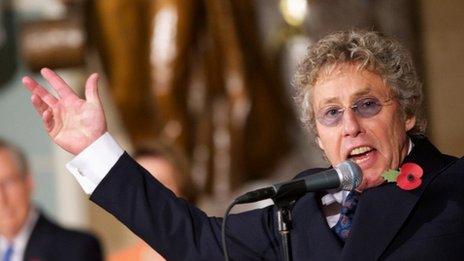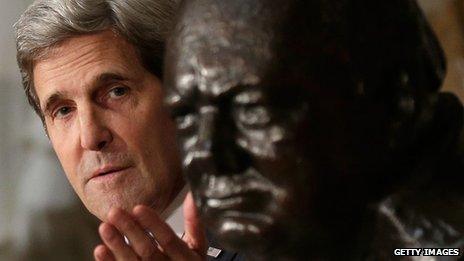Capitol Hill's Churchill bust reaffirms 'special relationship'
- Published
A bust of Winston Churchill was unveiled at the US Capitol 50 years after he was granted honorary American citizenship.
A bust of Winston Churchill has been dedicated on Capitol Hill, in a move that will delight champions of the so-called special relationship between the US and Britain.
The indomitable British statesman will reside alongside the statues of former US presidents in the marble-pillared Statuary Hall of Congress.
Wednesday's ceremony found political leaders in rare agreement - on the cigar-chomping wartime leader's legacy.
"Churchill is the best friend the United States ever had," said Republican House Speaker John Boehner. "This is one of history's true love stories, between a great statesman and a nation that he called a great republic.
"Today with peace, justice and a touch of majesty, Winston Churchill returns to the Capitol. This bust renews ties."
He suggested the bronze be a source of inspiration to his colleagues, "if you're looking for counsel or just hoping to feel a little braver".
Churchill's US popularity
It was Mr Boehner who invited the Illinois-based Churchill Centre to donate the statue.
Secretary of State John Kerry, Senate Republican Leader Mitch McConnell and House Democratic Leader Nancy Pelosi also gathered under the chamber's ornate dome ceiling to see the bust dedicated.
They were treated to a performance by another famous Briton, The Who's Roger Daltrey, who sang Won't Get Fooled Again and a cover of Stand By Me.
Churchill's grandson, the conservative MP Nicholas Soames, was also at the ceremony.
He told the BBC afterwards that his grandfather would have been proud to have his likeness alongside such leaders as Abraham Lincoln, whom he revered.
Why do Americans love Churchill, the first person ever to receive honorary US citizenship, so much?
It is more than simply because his mother was US born, believes George Washington University history professor Dane Kennedy.
He said: "What happens is politicians embrace a figure in the past in a way that sort of serves their particular political interest in the present.
"For certain people, Churchill represents resistance to any sort of appeasement to any sort of dictator."
Storm in teacup
There are two other statues of the British prime minister in Washington DC: one in the White House and one at the British embassy.
Keen watchers of transatlantic relations may recall how a Churchill bust generated a diplomatic storm in a teacup back in 2009.
The bronze, which had graced the Oval Office during the George W Bush administration, was returned to the British embassy at the outset of Barack Obama's presidency.
The story of the statue's relocation, which prompted some to fret that the special relationship was in eclipse, resurfaced during the 2012 presidential election race.
Republican candidate Mitt Romney vowed while on a visit to London last summer that he would restore the bust to the Oval Office if he won the White House.
Dan Pfeiffer, then an Obama communications director, issued a strongly worded White House blog, external insisting that the Churchill statue was still in the executive mansion, but had merely been moved to outside the treaty room.
He later issued a clarification after British embassy officials explained that there had actually been two Churchill busts in the White House.
The one that had been on loan to Mr Bush was returned to the embassy, it said.

Several members of Congress had their photo taken with Roger Daltrey

Secretary of State John Kerry at the dedication ceremony
- Published27 September 2013
- Published21 August 2013